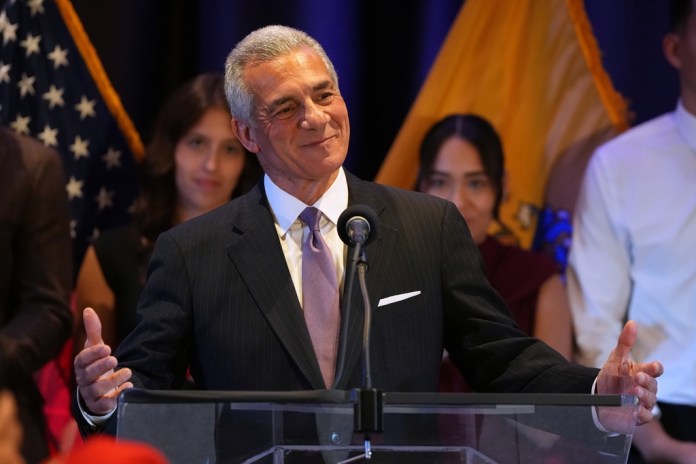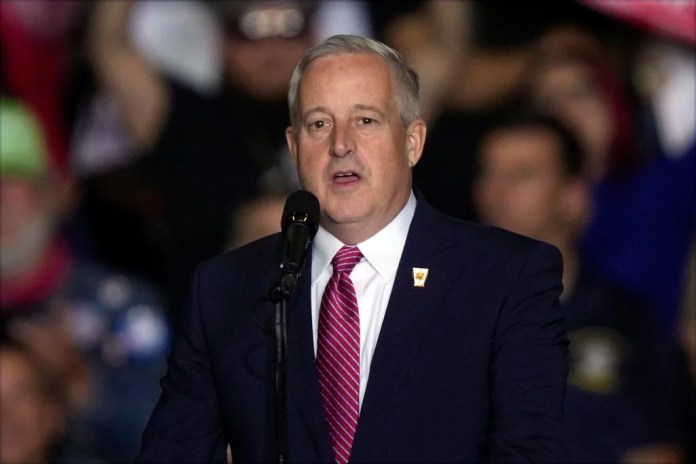GOP legal army guards against repeat of Trump’s stolen election claims – Washington Examiner
The article discusses the Republican National Committee’s (RNC) legal efforts ahead of the 2024 election, driven by concerns stemming from former President Donald Trump’s claims that the 2020 election was “stolen.” With less than two months until the 2024 election, the RNC has initiated numerous lawsuits aimed at ensuring election integrity and preventing unlawful voting, especially following the expansion of voting rules during the COVID-19 pandemic. While they claim to have filed over 100 lawsuits, the RNC has not disclosed how many have been successful.
Some notable victories include ruling in Arizona that requires proof of citizenship for voter registration, and decisions in Pennsylvania and Minnesota that aim to tighten mail-in voting regulations. However, the RNC has also faced setbacks in states like Nevada, where strict election laws aimed at voting integrity were not rolled back.
The article explores differing opinions within the Republican Party about the effectiveness of these legal strategies. While some view them as necessary for energizing the GOP base and ensuring secure elections, others fear that legal challenges may detract from crucial ground game efforts to mobilize voters, especially since early and mail-in voting are becoming standard practices. As the election approaches, there is concern that the focus on legal battles might hinder the Republicans’ overall campaign strategy and voter turnout.
Republicans’ 2024 legal army guards against a repeat of Trump’s stolen election claims
Legal fights over election integrity are well underway with less than two months to go to the election. This Washington Examiner series, Legal Games, will look at Democratic attempts to make sure they don’t have a repeat of 2016. Republican lawyers, meanwhile, are still spooked by what happened in the aftermath of 2020. Part 4 will look at Republican litigation to secure the 2024 election.
The Republican National Committee has been on the offensive since the 2020 election with a bevy of lawsuits forcing state officials to uphold laws that may prevent unlawful voting ahead of the 2024 election.
After states loosened up voting rules during the COVID-19 pandemic for the last presidential election, GOP lawyers have netted some limited wins in rolling back expansions in time for the November election.
These lawsuits come in the aftermath of former President Donald Trump‘s claims that the 2020 election was “stolen.” They are also meant to ensure the election will be safely conducted without any malfeasance, but some strategists caution that it could take away from ground game work against Democrats.
Many Republican wins in enhancing election safety came from GOP legislatures that updated their voting rules in battleground states that could decide the election. Conservative experts point to Georgia’s Election Integrity Act of 2021 as a prime example of rolling back excessive voting procedures enacted during the pandemic.
While the focus on election integrity with some 100 challenges was born out of Trump’s insistence the election was stolen, it has the added effect of possibly making it harder for the former president to lob allegations of widespread voter fraud as he did in 2020.
But his allies insist that these efforts are simply about curbing cheating in the election.
“Fighting for a secure election is President Trump’s top priority. We have fought and won more legal battles than ever before to protect the vote, and our Election Integrity operation will be on the ground to mitigate threats to the election in real time,” said Claire Zunk, the RNC’s election integrity communications director, in a statement to the Washington Examiner. “We are committed to making it easy to vote and hard to cheat for all Americans.”
Where the election integrity lawsuits have won and lost
The RNC touts 100-plus lawsuits it filed but has declined to say how many have been successful. While many are pending up to Election Day, the outlet Democracy Docket, founded by Democratic lawyer Marc Elias, has tracked 20 GOP losses and five wins on mail-in voting cases.
In a handful of the battleground and swing states the RNC has seen success from its legal efforts to curtail the Democratic embrace of permissive voting laws.
In Arizona, the RNC won a small victory this summer when the Supreme Court ruled officials must enforce proof of citizenship documentation for people using the state form to register to vote. The ruling means that some Arizona voters can only vote in federal elections this cycle until citizenship is proven.
“This is a major victory for election integrity that upholds a simple principle: American elections must be decided by American citizens,” said RNC Chairman Michael Whaley in a statement at the time.
The RNC received another win in Pennsylvania in September when the state Supreme Court threw out a previous ruling that allowed mail-in ballots that were not signed properly to be counted. Now only mail-in ballots that are accurately signed and dated on the envelope will be counted during the election, in a blow to Democrats.
In Minnesota, home of Vice President Kamala Harris’s running mate, Gov. Tim Walz (D-MN), the RNC saw victory by getting more than 1,000 voters who could be noncitizens or ineligible to vote inactivated from the rolls.
During the summer, the RNC scored another legal victory after discovering that Michigan Secretary of State Jocelyn Benson, a Democrat, had instructed election officials to ignore signature verification requirements for mail ballots and presume the validity of the signatures.
Along with the state GOP and the National Republican Congressional Committee, the RNC sued Michigan to block officials from presuming the validity of signatures. Michigan Judge Christopher P. Yates ruled that the presumption was “incompatible” with the state constitution in June, handing the GOP another victory.
But in other critical states, the RNC has been unable to roll back laws that were enacted during the pandemic.
In Nevada, voters will automatically receive a ballot in the mail unless they have chosen to opt out and were unable to convince a judge to block the state from accepting mail-in ballots up to four days after the election.
Jason Snead, executive director of the Honest Elections Project, described the changes in Nevada as a challenge to election integrity.
“Nevada passed a really bad election law a few years ago that gutted a lot of safeguards and went to all mail elections. They do not have proper list maintenance,” he claimed.
GOP base effect of leaning into Trump’s stolen election claims
Some GOP strategists applauded the efforts to make the election as secure as possible ahead of the 2024 election as “fantastic,” but others cautioned these efforts are simply about appeasing Trump at the expense of GOP victory on the ballot.
“What’s the difference between 2020 and 2024? They’re being proactive versus reactive. That is the biggest thing,” said Ford O’Connell, a Republican operative, on the RNC’s efforts. “Because a lot of times when you challenge these things, you can’t challenge them after the election. You have to do it before.”
In recent weeks, the RNC challenged the North Carolina State Board of Elections over its absentee ballot envelopes and not requiring identification to prove citizenship.
It also sued Benson in Michigan for not properly verifying absentee ballots and sued Nevada Secretary of State Francisco Aguilar, a Democrat, for allowing noncitizens to register to vote.
“These lawsuits are important to make sure that the rules are followed in administering elections which provide confidence for voters,” added a Republican attorney familiar with efforts. “It makes it less likely to have challenges or put us in the situation we’re in now where a majority of the American people don’t trust the administration elections.”
The attorney also suggested that it would help energize the GOP, which has shown heavy interest in protecting the election since 2020.
“The reality right now is that election integrity efforts are energizing the Republican base, and that’s what gets them to volunteer and build enthusiasm,” the lawyer said. “This is what they want to talk about, whether it’s the most well-heeled major donors or whether it’s the most basic grassroots [volunteers]. In both cases, they want to talk about election integrity.”
But some of the attorneys who spoke to the Washington Examiner also suggested the effectiveness of these lawsuits could also work against Trump if he were to revive any argument the election was stolen again.
The election lawsuits could come at the cost of ground game efforts
In the final stretch before Election Day, GOP operatives are voicing their concerns about the effect the lawsuits may have in turning out the Republican base.
“While there were and are important legal actions involving the time, place and manner of elections, it’s hard to justify the RNC or Trump campaign diverting money from get out the vote,” said Dennis Lennox, a Republican strategist.
“In many states, early voting, mail-in voting, and no-reason absentee voting are simply the reality of the game moving forward,” he continued. “What has happened to Republicans’ detriment is the party says it’s against these things, allowing Democrats to write the rules and setup the framework. We saw this in Michigan when Democrats got their dream through ballot initiatives after the Republican-controlled legislature missed the opportunity to create the framework.”
The Trump campaign’s ground game has largely been outsourced to affiliated super PACs and groups who are organizing volunteers to canvass in the battleground states. It’s in stark contrast to the Harris campaign that repeatedly boasts about its growing field offices and campaign staffers in the battleground states.
But the GOP has not completely disregarded ground game work. The Trump campaign and RNC are working on get-out-the-vote operations, including a Swamp the Vote USA website that allows voters to request mail-in ballots directly in Pennsylvania.
They are also relying on a cadre of Trump Force 47 volunteers to help turn out voters in battleground states and launched a Protect the Vote website which has helped garner 175,000 volunteer poll watchers, poll workers, and legal experts.
Yet not all Republicans are convinced these efforts are worth it.
“I think there’s a role for the RNC to support states and pursue litigation in some circumstances,” said a Virginia lawyer who requested anonymity to speak freely. “I think the breadth of this litigation and the focus and the pursuit of cases, usually with little merit, is a distraction and takes away from what the RNC core mission should be, which is to support state parties and elect Republicans to office.”
" Conservative News Daily does not always share or support the views and opinions expressed here; they are just those of the writer."




